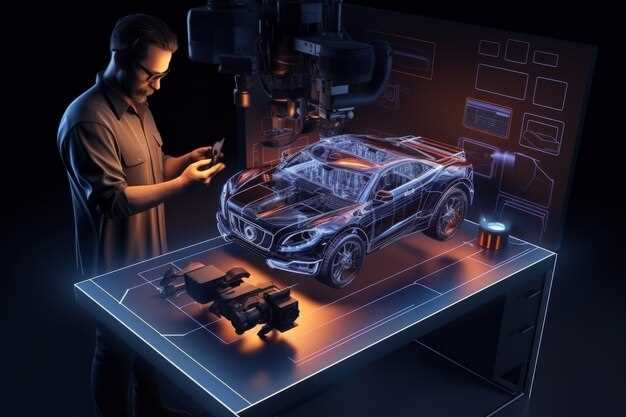
The automotive industry is on the brink of a technological revolution, with car tuning innovations poised to shape the future of vehicle customization. As consumers increasingly seek personalized driving experiences, the demand for innovative tuning solutions is set to soar. From advanced software enhancements to cutting-edge hardware modifications, the future of car tuning promises to empower enthusiasts and casual drivers alike to transform their vehicles into expressions of individuality and performance.
One of the most significant trends in car tuning innovations is the integration of artificial intelligence and machine learning. These technologies enable real-time data analysis and adaptive tuning, allowing vehicles to optimize performance based on driving conditions and personal preferences. By leveraging AI algorithms, drivers can expect systems that learn their habits, leading to smarter fuel management, enhanced power delivery, and improved overall efficiency in the future.
Additionally, the rise of electric vehicles (EVs) is redefining the landscape of car tuning. As traditional combustion engines give way to electric powertrains, tuning for EVs will focus on optimizing battery management systems and regenerative braking technologies. Innovations in this area promise to enhance range, efficiency, and performance, making electric cars more appealing to a broader audience. The future of car tuning will undoubtedly embrace these advancements as they pave the way for a greener and more performance-oriented automotive market.
Integrating AI for Personalized Tuning Solutions

The automotive industry is experiencing a significant transformation with the integration of artificial intelligence in car tuning solutions. AI technologies enable automotive enthusiasts and professionals to customize vehicles more efficiently, focusing on individual preferences and performance requirements.
One of the main advantages of AI in car tuning is the ability to process vast amounts of data collected from various sensors. These sensors monitor engine performance, driving habits, and environmental conditions, allowing AI algorithms to analyze and suggest optimal tuning modifications in real-time. This data-driven approach enhances the precision of tuning, ensuring that each vehicle is fine-tuned to meet its driver’s unique needs.
Additionally, AI can facilitate personalization through machine learning models that evolve with user habits. As drivers interact with their cars, the AI learns their preferences regarding speed, handling, and comfort. This continuous learning process leads to dynamic tuning solutions that adapt to changing driving styles, resulting in an unparalleled driving experience.
Moreover, AI-powered applications can offer enhanced diagnostic capabilities. By identifying potential issues before they become significant problems, these solutions support proactive maintenance and optimized vehicle performance. This predictive analysis helps car owners make informed tuning decisions based on their specific usage patterns.
Furthermore, the development of virtual tuning platforms powered by AI allows users to visualize and simulate various modifications before implementing them. This immersive experience empowers car enthusiasts to explore different tuning combinations, from engine parameters to suspension settings, without the risk of physical alterations. Such interactive tools are revolutionizing how tuning decisions are made, providing insights that were previously inaccessible.
In conclusion, the integration of AI into car tuning processes heralds a new era of personalized solutions. By harnessing advanced data analysis, machine learning, and virtual simulation technologies, the automotive sector is set to offer tailored tuning experiences that enhance vehicle performance while ensuring driver satisfaction.
Exploring Sustainable Materials in Performance Upgrades
The automotive industry is undergoing a transformation as the demand for sustainability grows. As we explore future trends in car tuning innovations, a significant focus is shifting towards the integration of sustainable materials in performance upgrades.
Traditionally, high-performance parts have relied on metal and synthetic materials that often come with a significant environmental footprint. However, advances in material science are enabling tuners to adopt alternatives that not only enhance performance but also minimize ecological impact. Bio-based composites, for instance, provide an excellent balance of strength and weight reduction, making them ideal for components like body panels and interior parts.
Furthermore, recycled materials are becoming increasingly popular. Tuning enthusiasts can now find performance upgrades crafted from recycled aluminum and plastics, which reduce the need for new raw materials and lower greenhouse gas emissions. These materials maintain durability while contributing to a circular economy, which is a key consideration for the future.
Another innovative approach involves the use of natural fibers, such as hemp or flax, in composite structures. These fibers are not only lightweight but also offer excellent tensile strength, making them suitable for various applications in performance tuning. Their use can lead to reduced vehicle weights, contributing to improved fuel efficiency and lower carbon footprints.
Incorporating sustainable materials into car tuning can also enhance vehicle aesthetics. Many of these materials showcase unique textures and finishes, appealing to consumers who prioritize both performance and design. As the industry moves forward, we can expect a rise in product offerings that feature environmentally responsible choices without compromising on quality or performance.
The transition towards sustainable materials in performance upgrades reflects broader automotive trends and consumer preferences for greener technologies. As manufacturers innovate and adapt to these changes, the future of car tuning looks not only thrilling but also aligned with global sustainability goals.
Advancements in Vehicle Connectivity for Enhanced Customization

The future of car tuning is being reshaped by advancements in vehicle connectivity, allowing for unprecedented levels of customization. Modern cars are increasingly equipped with integrated communication systems, which enable real-time data exchange between the vehicle and external platforms. This connectivity opens up new avenues for tuning enthusiasts to personalize their driving experience.
One significant trend is the rise of cloud-based services that provide vehicles with access to a multitude of applications. These platforms facilitate real-time adjustments to engine performance, suspension settings, and even aesthetic features like ambient lighting. This allows drivers to configure their cars based on specific driving conditions or personal preferences with ease.
Furthermore, advancements in telematics systems empower car owners to monitor performance metrics and make informed decisions regarding upgrades. With access to detailed analytics, tuning options can be tailored to enhance fuel efficiency, increase horsepower, or improve handling. As manufacturers continue to integrate IoT technologies, the potential for personalized tuning solutions will only expand.
Vehicle-to-everything (V2X) communication technology represents another layer of connectivity that enhances customization. By interlinking cars with infrastructure and other vehicles, drivers can receive real-time feedback on road conditions and traffic patterns. This information can be utilized to optimize vehicle settings dynamically, ensuring a superior driving experience.
Moreover, the emergence of user-friendly mobile applications allows for a seamless interface between drivers and their vehicles. Owners can easily adjust settings remotely, schedule maintenance, and even receive alerts about potential issues. The convenience offered by these applications fosters a deeper connection between the driver and the car, making customization more accessible than ever before.
In conclusion, advancements in vehicle connectivity are paving the way for a future where car customization is more intuitive and data-driven. As technology continues to evolve, tuning options will become increasingly sophisticated, allowing drivers to create their ideal driving experience.


